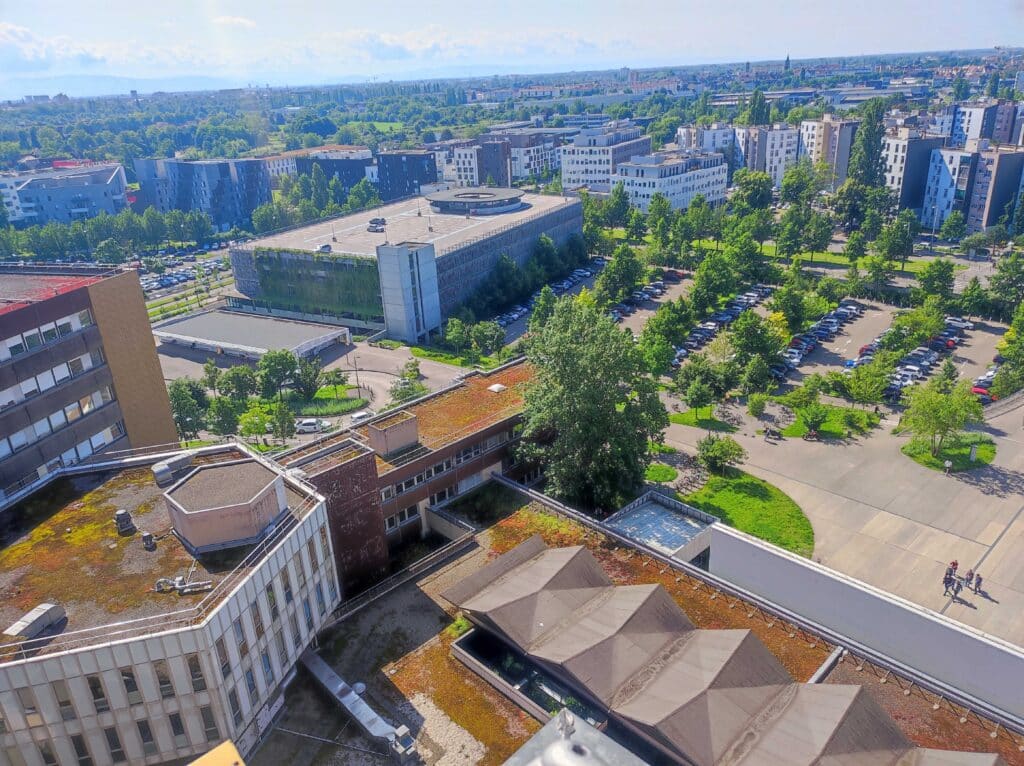Retail real estate plays a central role in shaping the modern consumer experience. Among its many assets, shopping centers stand out as complex ecosystems that go far beyond storefronts and foot traffic. Behind their daily operations is the often-overlooked field of property management, where strategic decisions, leasing, and maintenance come together to keep these commercial hubs running efficiently and profitably. This article takes you behind the scenes of retail real estate to explore what truly powers shopping centers.

Retail real estate: a quick overview
Defining the notion
Retail real estate encompasses physical properties—such as shopping centers, malls, and standalone stores—designed for retail activities. These assets are directly owned, developed, and managed by companies or investors. In contrast, Retail Real Estate Investment Trusts (REITs) are companies that own and manage retail properties such as malls, shopping centers, and power centers. Investors can buy shares in REITs, gaining exposure to retail real estate without directly owning the properties themselves. This distinction highlights the difference between tangible property ownership and investment in property portfolios.
Shopping centers, a significant component of retail real estate, vary in size, design, and tenant mix. These centers can range from small neighborhood centers to large regional malls, each serving different community needs and demographics. The VTS article for instance further categorizes shopping centers into eight types, including:
- Neighborhood Centers: Typically anchored by supermarkets or drugstores, serving daily needs.
- Community Centers: Larger than neighborhood centers, often featuring a broader range of stores.
- Regional Malls: Enclosed centers with a wide variety of stores and entertainment options.
- Power Centers: Dominated by big-box retailers offering a variety of goods.
- Lifestyle Centers: Upscale, open-air centers combining shopping, dining, and entertainment.
- Mixed-Use Developments: Integrating retail with residential or office spaces.
These diverse formats cater to varying consumer preferences and urban planning objectives, reflecting the dynamic nature of retail real estate.
Phases of retail real estate
Retail real estate has demonstrated notable resilience in the post-pandemic landscape, emerging as one of the most stable segments within commercial real estate. According to recent insights, low vacancy rates and strong demand for essential retail spaces—particularly grocery-anchored shopping centers—have underpinned solid financial performance and continued investor interest.
At the same time, the sector is evolving rapidly. Trends highlighted by Forbes emphasize the rise of wellness-oriented tenants, experiential retail, and neighborhood shopping formats, alongside growing integration of omnichannel strategies and last-mile logistics. These shifts reflect changing consumer behaviors and a broader adaptation of retail real estate to new market realities.
However, as reported by The Wall Street Journal, the positive momentum has softened entering 2025, with leasing activity slowing and an uptick in retail bankruptcies introducing some uncertainty. While the outlook remains generally positive, these developments underscore the need for cautious optimism as the sector navigates emerging challenges.

Retail real estate: financing, management and transactions deployment of shopping centers
Retail real estate: how finance lays the groundwork for shopping centers
In the dynamic retail landscape, real estate companies play a pivotal role in shaping the success and evolution of shopping centers through their expertise in financing. Securing and managing capital is essential not only for acquiring prime retail properties. It also is key for funding renovations, expansions, and repositioning strategies that meet the shifting demands of consumers. These companies leverage diverse financial tools to ensure their shopping centers remain competitive and vibrant hubs in the metropolitan area. Those vary from traditional bank loans and equity investments to innovative financing structures. In this way, real estate firms act as both investors and stewards, providing the necessary resources to sustain growth. They furthermore attract tenants, and deliver compelling shopping experiences to the communities they serve.
Property management: key to maintain shopping centers’ day-to-day operations
Beyond financing, effective property management is crucial for the smooth running of shopping centers. Retail real estate is responsible for overseeing daily operations, including tenant relations, facility maintenance, marketing, and security. This hands-on management ensures that centers remain attractive and accessible to shoppers while providing a supportive environment for retailers to thrive. This sector addresses operational challenges and adapt its policies to evolving consumer behaviors. This helps maintain high occupancy rates and foster a positive shopping experience. Ultimately, strong property management bridges the gap between strategic investment and customer satisfaction. This allows to keep shopping centers vibrant and economically sustainable in a competitive retail market.
Asset management for shopping centers
In the retail real estate environment, asset management plays a central role. Indeed, they optimize the long-term financial performance of shopping centers. While property managers focus on day-to-day operations, asset managers are responsible for enhancing asset value. Moreover, they delivering strong returns on investment (ROI) for property owners, often institutional investors or REITs.
Their responsibilities include defining investment strategies, conducting financial modeling, setting revenue targets, and tracking key performance indicators such as Net Operating Income (NOI), Internal Rate of Return (IRR), and capitalization rates (Cap Rate). They also oversee leasing strategies, tenant mix optimization, and capital expenditure (CapEx) planning, including major renovations or repositioning initiatives to align the asset with market demand.
Asset managers continuously analyze market trends, consumer behavior shifts, and competitor activity to inform strategic decisions. Their goal is to increase asset valuation and ensure sustainable cash flow, often coordinating with both property managers and leasing teams to drive performance. In an era where retail is rapidly evolving, effective asset management is critical to future-proofing shopping centers and maintaining their competitiveness in the real estate portfolio.
Transactions deployment: retail real estate drives shopping centers evolution
Real estate companies play a fundamental role in the transactional activities that continuously shape shopping centers. These transactions are either acquisitions, dispositions, or lease agreements. They impact the composition, performance, and growth potential of retail portfolios. By leveraging deep market knowledge and negotiation expertise, these firms identify valuable opportunities, optimize tenant mixes, and adjust holdings to respond to evolving market conditions. Through active transaction management, real estate companies ensure shopping centers remain competitive. Moreover, they assure their well-positioning to meet the changing needs of both retailers and consumers in a dynamic retail environment.
Retail real estate: a few companies
| Company | Core Business | Assets Under Management (AUM) | Number of employees | Main DC Area Shopping Centers | Other relevant information |
| Federal Realty Investment Trust (FRT) | Ownership & management of retail/mixed-use properties | $8B+ | ~330 | The Shops at Georgetown Park, Reston Town Center, Bethesda Row | Leader in urban retail, strong ESG commitment |
| Kimco Realty | Ownership and operation of retail shopping centers | $18B+ | ~650 | Montgomery Mall, Landover Mall redevelopment | Large retail portfolio, active asset repositioning |
| Simon Property Group | Owner/operator of premium malls & outlets | $34B+ | 3,000+ | Tysons Corner Center, Fashion Centre at Pentagon City | Largest US mall operator |
| Brookfield properties | Retail & mixed-use property management and development | $75B+ (global) | 10,000+ | Tysons Corner Center, Pentagon City Mall, Springfield Town Center | Global platform, major player in retail revitalization |
| CBRE | Asset management, property management, leasing, transactions | $60B+ (AUM including client funds) | 120,000+ | Provides services across DC area malls and offices | World’s largest real estate services firm |
| Peterson Companies | Development, ownership, and management of retail & mixed-use | $5B+ | 200+ | Ballston Quarter, Arlington Mill | Regional focus, strong local presence |
| KLNB Retail Properties | Management and leasing of retail centers in MD/VA | ~$1B (regional assets) | ~50 | Multiple regional retail centers | Regional specialist in retail property management |

Retail real estate acquire and refurbish shopping malls: some case studies
Brookfield Properties & CBRE: two real estate companies focused on The Parks Mall at Arlington, Texas
Strategic refinancing to support shopping center transformation
In February 2025, Brookfield Properties and CBRE Investment Management secured a $215 million refinancing deal for The Parks Mall at Arlington, a 1.5 million-square-foot regional mall located in Arlington, Texas. The financing package included a $165 million senior mortgage loan from Nuveen Real Estate. It had also a $50 million mezzanine loan from Torchlight Investors, both with four-year fixed-rate terms.
This refinancing supports a $45 million renovation project aimed at modernizing the mall. Among them, the conversion of an 82,000-square-foot space formerly occupied by Dick’s Sporting Goods into new retail and dining areas. On the other hand, Dick’s will be relocated to a new 120,000-square-foot experiential retail space.
Sustainability and strategic revitalization at the core
Importantly, the renovation plan integrates sustainability initiatives such as energy-efficient lighting, water-saving fixtures and waste management. This will help reduce the mall’s environmental footprint. Brookfield and CBRE have emphasized their commitment to green building standards and are exploring certifications aligned with LEED (Leadership in Energy and Environmental Design) to ensure the property meets modern ecological expectations.
This strategic refinancing and renovation underscore Brookfield and CBRE’s dedication to revitalizing The Parks Mall. It balances enhanced customer experiences with responsible environmental stewardship — key factors in maintaining competitiveness in today’s retail sector.
Tysons Corner Center: a shopping mall operated by the retail real estate company Macerich
A real estate-driven evolution of the modern shopping center
Tysons Corner Center, situated in Tysons, Virginia, is the largest shopping mall in the Washington DC metropolitan area. It covers approximately 2.4 million square feet and hosting over 300 retailers ranging from luxury brands to popular national chains. As a flagship property owned by Macerich, one of the leading publicly traded Real Estate Investment Trusts (REITs) focused on retail, Tysons Corner Center plays a pivotal role in the region’s retail ecosystem, drawing millions of visitors annually and serving as a major economic driver.
In May 2025, Macerich unveiled a $100 million capital investment plan to modernize and reposition the mall. This happens in response to evolving consumer behaviors, rising competition from e-commerce, and changing demands for experiential retail environments. This plan allocates $66 million to upgrading store interiors, introducing higher-end and experiential retailers, and refreshing the tenant mix to attract a broader demographic. An additional $45 million is earmarked for comprehensive mall improvements. This including upgraded common areas, enhanced lighting and signage, and crucial infrastructure updates.
Smart infrastructure and strategic investment for long-term value
A significant component of the modernization effort involves the parking facilities, where Macerich is investing in a smart parking system designed to improve customer convenience and traffic flow in the mall’s underground lots. This technology will help optimize space utilization and reduce friction points, improving the overall visitor experience.
Macerich’s investment highlights the essential role that real estate companies play in sustaining and growing retail assets. By strategically allocating capital toward both aesthetic upgrades and operational innovations, Macerich is not only enhancing shopper satisfaction but also reinforcing Tysons Corner Center’s position as a premier retail destination within the competitive Washington DC market. This approach reflects a broader industry trend where real estate firms must continuously evolve their assets to meet changing market dynamics, blending financial management, asset operation, and customer experience design.
The increasingly integrated role of retail real estate
Retail real estate plays a critical and increasingly integrated role in the shopping center landscape. By managing assets, securing financing, and orchestrating key transactions, they actively shape and improve these spaces to meet evolving consumer expectations. From major construction projects to technological investments in value added services such as guidance for the elderly or revolutionary smart parking experience. Their involvement drives ongoing innovation, an essential force in keeping retail environments dynamic, competitive, and customer-focused.


